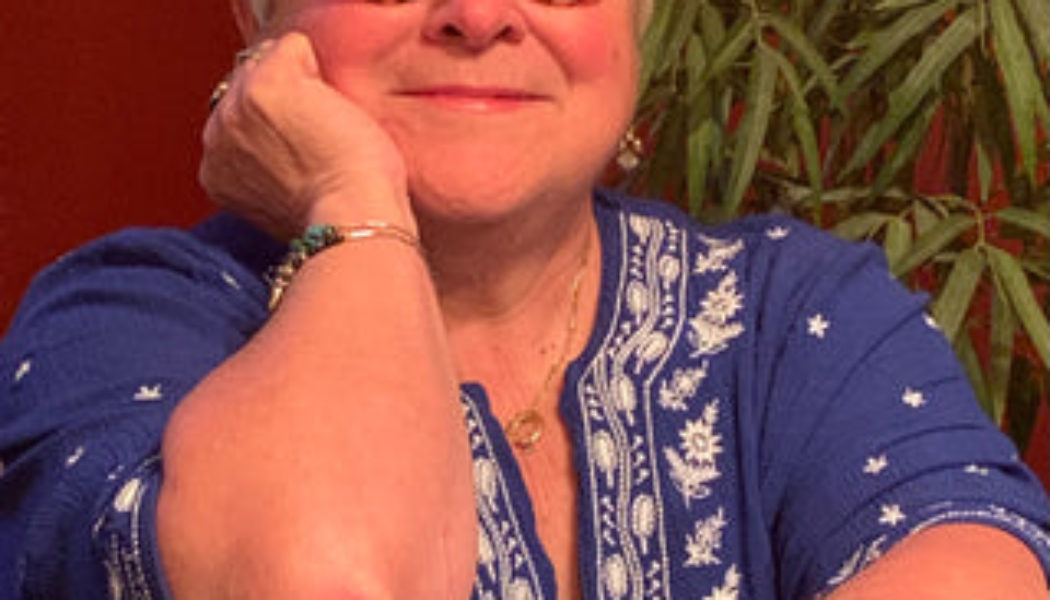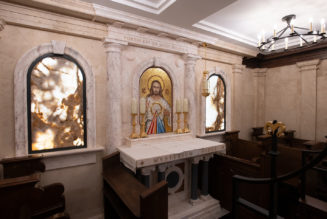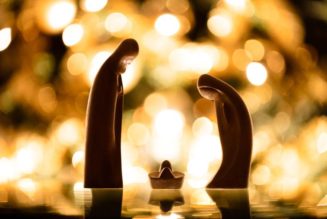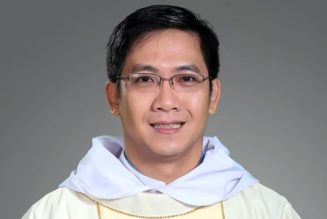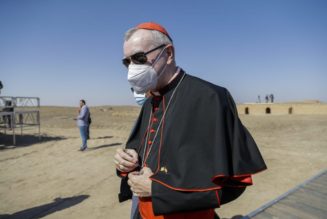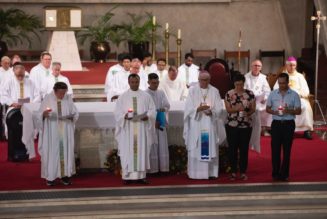I just kept writing about everything I read and everything I remembered about childhood and motherhood and put it together with what I was experiencing now. I tried to be honest and to share it with a world of others who might be feeling the same way.
An Interview with Writer, Denise Trull.
By Carrie Gress
I first stumbled upon an article by Denise Trull at Dappled Things some time ago. Since then, I think I’ve read just about everything she has published there. When her pieces post, I feel a bit like a greedy child grabbing at a new bar of chocolate, looking to savor each sentence. I have yet to be disappointed by her work, and on occasion, even been brought to tears by the beauty and poignancy of her written words.
What makes Trull’s voice so appealing is that it is shot through with wisdom and suffering, tenderness and discovery, memory and hope. She extracts depth from the seemingly shallow. Her voice is one so many women are looking to hear today. It isn’t scolding or preaching, but more like a journey one is privileged to take with her. Her words have that sweet grandmotherly character that comes from hard won experience and are offered to us to digest, delight in, and tuck away somewhere for the future. So grab a cup of tea (or coffee) and join us.

TOH: Tell me a bit about yourself and what got you writing? When did you start publishing with Dappled Things.
TRULL: I am the youngest of eight children born to parents, whom I now realize most acutely, were outstanding.
My mom was a stay at home mom who loved being just that. She created this wonderful atmosphere of beauty all around us growing up. My siblings and I still talk about it with a warm, sometimes misty nostalgia.
As a child in Quebec, Canada, she attended school with the Ursuline sisters. There she learned how to paint, sew, dance, and sing in addition to receiving a solid education taught by these lovely, intelligent, motherly women. Most importantly, she learned etiquette and an unstuffy refinement, which seems to be an extinct art in our day that desperately needs to be revived as it has so much to do with charity and kindness.
Her days were also spent celebrating the liturgical seasons with the nuns. She learned to make little altars for feast days and took in many French customs surrounding those feasts. These were so a part of her by the time she became a mom, that she naturally set up her household in the same way.
Daily suppers were served on tablecloths with nice dishes. Everyone was expected to be at supper and needed to be home by the time our Parish Church tower rang out the Angelus.
My father would lead the family rosary each night, or at least tried to be faithful to it. He also blessed the Advent wreath with great solemnity on the First Sunday of Advent, and led all the toasts for feast days.
He was the consummate provider and generously gave of his time and money to find us the best educational opportunities. He, too, had a wonderful education surrounded by priests who taught him the beauty of tradition and prayer. He grew up listening to beautiful music, and reading beautiful books.
I spend so much of this question on my parents because that is where I come from. As a child I took in all these customs and habits and seasons and remembered them in detail, as children often do. There is no time more filled with a keen observation than childhood. So, it is important that it be filled with beauty. Mine was.
I was by nature an introvert, though I could join in a group and have a good time. But my natural state was to be alone in my room reading, dreaming, and writing poetry or stories.
I loved metaphors. I saw symbols everywhere – and connected them together in my mind. It is just the way I was ‘knit in my mother’s womb’, I suppose. I never questioned where it came from. But I was given time and place to do my dreaming and writing. I was left alone to do this and I am forever grateful to my parents for not over scheduling my days and letting me be my introverted self.
I wrote poetry throughout high school, though I am certain it was quite bad and overwrought as teen poetry often is. But it gave me a way to connect my impressions of things and to name feelings. This was important, to connect reality with thought through written words.
When I got married, I stopped writing poetry and stories. I stopped reading anything other than children’s books – which were, in hind site, their own smaller portals to future beauty in my memory. I stored them away without knowing I was consciously doing it.
Being a stay at home mom, I had time between milk spills and diaper changes and night feedings to gather up impressions and metaphors I found all around me, especially through my children’s reactions to the world around them. This is why I decided to home school – to give them time to react to and to enjoy their world with each other – to store up quiet memories as they went. I knew how important those would be.
There came, though, the inevitable day that my children were all moving on as adults and I found myself more and more alone in the house. I went through a space of real depression at this point and felt extremely out to sea. It was a hard and lonely time.
I ended up, by providence, going to morning Mass at a Church called Epiphany of Our Lord. There was a young pastor at this church who, in very truth, stirred up all that sleeping poetry and metaphor in my soul by his daily sermons. He was quite unique, some might say eccentric. I found him lovely. He quoted poetry in those sermons. He quoted obscure and lovely writers and connected them all to the daily readings. He had me.
I continually murmured to myself: who is this? I must meet him. And I did. We became friends and conversed about everything under the sun once or twice a month. He had studied literature at Yale and was fabulously well read in ways I had never been. He was also a gifted writer – a lyrical writer who made me think beautiful thoughts and ask mystified questions.
I felt my inner metaphors dancing around within me. I had come back to poetic life. He was very kind and listened to my angst about empty nesting more times than I can count. He leant me books and made fun of my quirks. He most of all did not think of me as an old has been, but as someone who was becoming a new other if only I had the patience to wait. I owe him so much, I can’t even express the depth.
Around this same time, I re-discovered the books in my basement. All the half read books that fell by the wayside during the all consuming raising of children years. I discovered biographies most of all. And I started reading them again. Thoughts were soon coming thick and fast. I started writing them down in little Facebook posts and in a blog I started.
The more I met with my priest friend, the more I bounced my thoughts off of him. It was so good to be thinking again! I wrote about my childhood, my motherhood, my impressions of nature, anything that came to mind. All those stored memories came into play.
Then one day I decided to send one essay to Dappled Things. I love this magazine because it approaches beauty in very creative ways. The essays are all thought provoking and unique.. I also admired their efforts to give first time writers a chance to be published, which is such a gift. It took me forever to send in my first essay. It was on Nathaniel Hawthorne. I actually sent it in at last and then promptly panicked. I sent an anxiety ridden email to my friend and he calmed my angst and supported me through the panic – all this while not really caring in the least for Nathaniel Hawthorne, himself.
It is extremely difficult to let fly your thoughts to the outside world for the first time. They are so much a part of your soul and you do not want them to be trampled upon. With my friend’s support and kindness I sent it off and waited.
Dappled Things took it and published it. I was really quite pleased with myself, I must admit. I felt like the old girl still had it in her. There is nothing like seeing your thoughts in print with your name at the bottom at the age of sixty-two. I felt positively spry!
After that, I just kept writing about everything I read and everything I remembered about childhood and motherhood and put it together with what I was experiencing now. I tried to be honest and to share it with a world of others who might be feeling the same way. Dappled Things supported my particular voice. And that is how it all came to pass.
I consider this new springtime a gift from God. It has become a vocation of sorts – the written word. A vocation to show that beauty still exists in all the ordinary ways of life which in the end are quite extraordinary.
TOH: Your voice feels so fresh and needed today, especially at a time when so many of us can’t even define womanhood. What sort of advice did you get along the way as a woman/mother that has stuck with you or what advice do you give young women?
TRULL: I owe much of my voice to my Mother and Father. I grew up in a beautiful home. Not everyone gets that gift, I am aware.
The world started to unravel in the 1980’s when women began to search for careers and abandoned the home as a waste of time. Their daughters did not receive any habits of homemaking handed on to them. They had to figure out on their own how to raise babies and children. It became inevitably like clueless children being asked to raise children.
The results were devastating – latch key kids and divorce and an unraveling family life that produced a sense of being lost and not knowing why. It broke the vital continuity of family culture being passed down from parents to children. That is why I feel great admiration and awe for many of these young women who, by the grace of God, have come to see the beauty of married life all on their own, and stay at home with their children. They are bringing back all the old, lost homemaking arts again by sheer will power. I salute them! They are learning to love being home and making it a grand adventure for their children. They have taken up the responsibility for mending the broken cultural thread and passing on their faith and customs once again to their children.
Those women are my ‘advice’. Create a home. Fill it with beauty, customs, traditions. Being a mom is quite adventurous. If you do it right, it is a life filled with busy effort and much satisfaction. Whatever natural gifts you possess will be what your children need. Teach them poetry, writing, embroidery, sewing, bread making, organization, love of art, painting, running, swimming, anything at all. Whatever you have been given will be what these particular children of yours need. Trust that this is so.
There is no greater gift you can give a child than this stable, inviting home filled with spaces for them to rest and to create and to find their inner voices. My own parents gave that to me. Time and space. That is the most important thing. You will see how incredibly your children turn out given those two things: space and time.
TOH: I love how focused you are on the home and family in your writing. Is that intentional or just familiar, or both?
TRULL: Home and family life are what I know, and intimately. It is what feeds my pen. I work from vivid childhood memories that are precious to me and have affected so many aspects of my mind and heart and have brought great consolation to me in more unstable, confusing times of my life.
I also have a great urgency to show the world how the most crucial beauty dwells there in the home and family. It is the well from which we gather our life long memories and impressions. It is perhaps my spiritual soapbox. I was given a beautiful home myself. I feel impelled to share what that looks like to those who are hungering for it – to give them support and encouragement that it IS possible to live family life in modern times. For me, it has evolved into a vocation of sorts.
TOH: You clearly have a love of reading. What are some of your favorites?
TRULL: I love poetry most of all, but I have also come to love books on natural history which take an enthusiastic dive into the “dearest freshness deep down things”, as Hopkins was wont to say.
Favorite stories of natural historians I have read are the letters of John James Audubon, Mary Delany and her intricate paper flower creations, Wendy Williams delightful book on butterflies, and the story of Wilson Bentley who spent his whole lifetime photographing snowflakes. His book of snowflakes is an astoundingly exquisite thing. I spent a delightful winter once trying to photograph my own snowflakes with him as inspiration.
My favorite poets are: Auden, Emily Dickinson, Gerard Manley Hopkins, Yeats, Christina Rossetti and George Herbert. They have never failed to bring consolation to me or to stir up my heart for the greater beauty hidden there. I have gotten into the habit lately of reading biographies of great artists in tandem with their works of art. I am fascinated how they navigated the world and how they discovered their particular art forms there. What experiences shaped their poetry? What adventures produced their paintings? It is endlessly energizing to experience so much real life in their stories. How they loved. How they held on to belief. How they used their gift.
Favorite biographies of mine include: Dietrich Bonhoeffer, Mary Delany, Oscar Wilde, George Herbert, Christina Rossetti, Emily Dickinson, and Helen Hanff.
TOH: I think what is striking about your writing is that it is very visual, and even in your blog, you talk about how you are someone who looks carefully, even stares, at the world. I have imprinted in my memory visuals that your essays have conjured up through your well written words. Tell me more about this gift you have, your ability to write about what you see, and perhaps ways that others might be able to cultivate it even just for living well?
TRULL: I think I was born staring at things. I have always done it. I don’t especially like ‘big pictures’ but always prefer the small, intricate parts that make up the whole. I always have my head in bushes and trees (to the consternation of my neighbors) looking closely at sepals and pistons and colors and bees drunk on pollen.
I am a consummate “inscaper.” I find worlds in miniature. I am quite sensual in that regard. I love the senses and steeping myself in them. I love the feel of things, the sounds they make, the way they move. I love light dappling all over everything. It feeds my soul and sometimes fills me with rather overwhelming, ecstatic feelings that can only be relieved by writing about them. So, writing becomes an imperative for me. Without it, I might explode! But I cannot tell you why or how this came about. I am just that way.
I am also quite steeped in my senses, I have come to have a great devotion to the Incarnation of Jesus. His physical ways. I feed my prayer with his daily doings, as they make holy every aspect of the life I live myself. It draws me to Him and shows me how much He gave up for us as God and yet how much he truly loved the
human experience we live.
I love how He cooked fish, walked everywhere, wasn’t afraid to physically touch people, smeared mud on blind eyes for a cure, became overwhelmed by the sadness that is death for his friend Lazarus. He wept. Like me. He sat down at a well and talked to a Samaritan woman and gave her the surprise of her life – changing it forever because he bothered to listen to her.
What kind of voice did he have? He baked bread. He drank wine. He had friends whom he loved being around though they were uneducated fishermen, some of them. He expressed his heart wrenching grief at having to part from them. He loved his mother and listened to her. He tells me daily to love him in those things in order to find his Godhead. When I do it, they astound me.
What is God like that he would want to become like me? It is an endlessly fascinating question. I want so much to touch him and to hear his voice and to know what his hands look like. This heightened life of sense makes faith harder for me. But God has brought me along.
For many years I received Communion in the hand just so I could touch Him physically. I did it with all reverence, but that is why I did it. It is the way I wanted to know him. Eventually, my priest friend convinced me that it is just as beautiful to be fed the Body of Christ by a fatherly hand that is consecrated to hold Him as He should be held. I understood this after a while. And it has become a lovelier thing still to receive the physical body of Jesus from the holy hand of a friend. I am blessed indeed.
My advice is to try to remember childhood things. Take walks and start noticing things. Put your head in bushes. Listen to birds. Watch squirrels for about 15 minutes. Truly gaze at the world. Let water pass over your fingers and try to describe it.
Meaning is everywhere. All of nature is a thin veil between us and the Eternal Beauty who has so much to tell us through them. Learn to quiet your heart and listen. You won’t be disappointed. I have met him there sometimes. You will as well.
Join Our Telegram Group : Salvation & Prosperity

